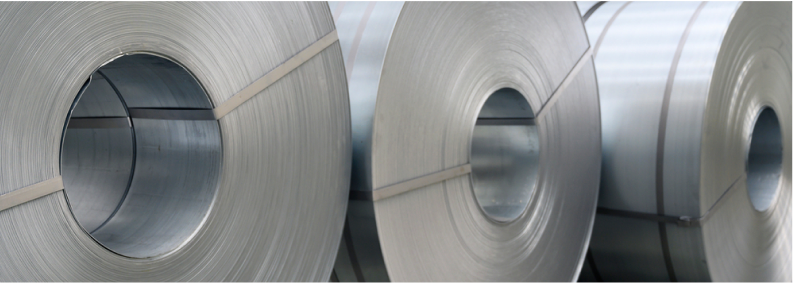Stainless Steel

Key Properties of Stainless Steel
- Corrosion Resistance: Stainless steel resists corrosion and oxidation, making it ideal for harsh environments.
- Strength and Durability: Known for its high tensile strength, stainless steel performs well under stress and is resistant to wear and tear.
- Aesthetic Appeal: Its smooth finish and ability to retain a polished appearance make it a popular choice in both industrial and decorative applications.
- Hygiene and Cleanliness: Stainless steel is easy to clean and doesn’t support bacterial growth, which makes it essential in medical and food processing industries.
- Recyclable: Stainless steel is 100% recyclable, aligning with sustainable practices across industries.
Common Grades of Stainless Steel
- 304/304L: One of the most commonly used grades, ideal for general corrosion resistance and used in kitchen equipment, storage tanks, and appliances.
- 316/316L: Contains molybdenum, which improves corrosion resistance, particularly in marine and chloride environments. Often used in food processing, pharmaceuticals, and offshore applications.
- 321/321H: Titanium-stabilized, high-temperature resistant, and excellent for applications involving welding, such as petrochemical and refinery environments.
- 317L: Known for high resistance to pitting and crevice corrosion, often used in chemical and paper processing.
- 310S: High-temperature resistant with good oxidation resistance, often used in furnace components and industrial boilers.
Applications of Stainless Steel
- Construction and Architecture: Structural components, handrails, and exterior cladding.
- Automotive and Transportation: Exhaust systems, trim, and body parts.
- Medical and Pharmaceutical: Surgical instruments, implantable devices, and lab equipment.
- Food and Beverage Processing: Tanks, conveyors, and food preparation surfaces.
- Oil, Gas, and Chemical Processing: Pipes, valves, tanks, and equipment subjected to corrosive environments.
Choosing the Right Stainless Steel Grade
- Corrosive Environment: Grades like 316 and 317L are preferred for corrosive settings, especially where chlorides are present.
- Temperature Requirements: Grades like 321 and 310S are excellent for high-temperature environments.
- Weldability: Grades such as 304L and 321 offer reduced carbide precipitation, making them suitable for applications requiring welding.
Stainless Steel Solutions for Your Industry Needs
Quality Assurance & Packaging
We prioritize quality at every stage of production. All our products adhere to ASTM, ASME, EN, ISO, and DIN standards, ensuring superior performance. Each product is inspected rigorously, from raw material sourcing to final packaging, with the option for third-party inspection.
- Marking: Every fitting is marked with grade, size, lot number, and our trademark.
- Packaging: To prevent damage during transit, products are packed in wooden cases, ensuring safe delivery.
If you’re looking for high-quality, reliable stainless steel pipe fittings for your industrial projects, contact Riyaarth Overseas today. We offer customized solutions to meet your needs, ensuring high performance and durability in every product we deliver.
FAQs
Grade 304 is the most widely used due to its balanced properties, affordability, and suitability for a wide range of applications.
Yes, grades like 316 and 316L are particularly well-suited for marine applications due to their high resistance to chlorides and corrosion.
Absolutely! Stainless steel is 100% recyclable, making it an eco-friendly choice that can be reprocessed without losing its quality.

Products
Industry We Serve
- Oil & Gas industries
- Chemical process industries
- Pump and valve in high pressure component
- Food industries
- Pulp and paper industry
- Aerospace industry
- Power plant
- Mechanical component
- Sugar industry
- Cement industry
